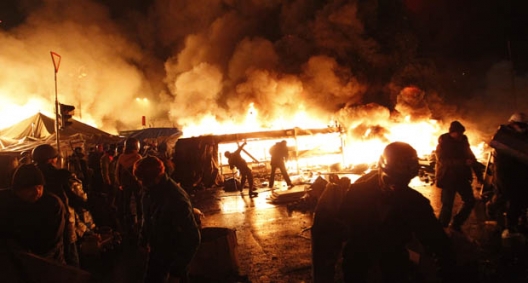
US, EU Must Sanction Kyiv Authorities, Wilson Says
The newly violent confrontation in Kyiv between the government and protesters has shoved Ukraine’s three-month-old crisis into a new, more dangerous phase that poses increased risk of a civil war, Atlantic Council Senior Fellow Adrian Karatnycky says. The attack by police on Tuesday against demonstrators demanding a reduction in the powers of President Viktor Yanukovych sparked fighting that left 26 people dead, and signaled that Yanukovych is not “interested in anything but a suppression of these protests,” Karatnycky said on PBS Newshour. “I think he is gearing up for a terrible battle that could drift into civil war.”
Karatnycky says both sides in the conflict have hardened their positions and are increasingly ready to fight. The only way to avert a broader eruption of violence is for Yanukovych’s big-business allies, the billionaire “oligarchs” of Ukraine, to use their positions in Ukraine’s parliament to halt the police repression, which several key oligarchs have said they oppose, according to Karatnycky.
Time for Ukrainian patriots to step up & not let Ukraine slip into civil war. Protestors, parliament, business need to join together.
— Damon M. Wilson (@DamonMacWilson) February 18, 2014
As the European Union prepared to vote on sanctions against Ukraine at an emergency meeting Thursday, the Atlantic Council’s Damon Wilson laid out three essential steps for a “deft, coordinated US-EU diplomacy” that might “avert civil war and salvage the prospect of a European future for Ukraine.” According to Wilson, those are:
- “A ratcheting up of targeted visa and financial sanctions against those in power implicated in the use of force and aimed at encouraging power brokers to hedge their bets by distancing themselves from Yanukovych ’s crackdown strategy;”
- “Direct messaging to Western contacts within the security services reinforcing their instincts to remain on the sidelines and not use force against their own citizens;” and
- “Blunt talk with Moscow about the consequences of any external intervention” in Ukraine, where local journalists have reported signs of Russian preparations for a possible confrontation in Crimea, which many nationalist Russians want to take back from Ukrainian control.
OTHER KEY POINTS OF ANALYSIS by Karatnycky, in his PBS interview, are these:
THE OPPOSITION’S READINESS TO FIGHT.
“As we speak now in the western district of Ukraine, militia officers are taken over peacefully where militia people are simply leaving, or violently if they’re resisting. That means weapons of substantial proportion are going to be in the hands of the public. There are three million firearms that are held by citizens legally in the Ukraine.”
“In the last weeks, thousands of Ukrainian oppositionists have been organizing into very disciplined, organized self-defense groups. Several thousand of them are on the public square in Maidan [Kyiv’s Maidan Nyezalezhnosti, or Independence Square] in the face of violence which initially claimed five people in mid-January and terrible beatings of hundreds and thousands of people, concussions of people, abductions of dozens of people, death squads operating. And so there was sort of a movement towards self-defense. And this is now likely to accelerate in the face of this violence.”
RUSSIA’S DIRECT ROLE IN UKRAINIAN POLICE ACTION.
“Russia is very deeply engaged. It is well-known from my sources, which are close to the intelligence community, that Russian advisers are working with the ministry of internal affairs and gaming the attacks on the public square. And I believe that the Russians have all along miscalculated the nature and the depth of public anger, as has Mr. Yanukovych. And I think that their — this miscalculation can lead to a catastrophic loss of life that will not end up in the quelling of protests.”
Image: Anti-government protesters throw missiles during clashes with riot police at Kyiv’s Maidan Nyezalezhnosti, or Independence Square on February 18, 2014. Ukrainian riot police took over part of the square overnight, pushing back anti-government protesters whose tents were burning, local television showed. (REUTERS/David Mdzinarishvili)
